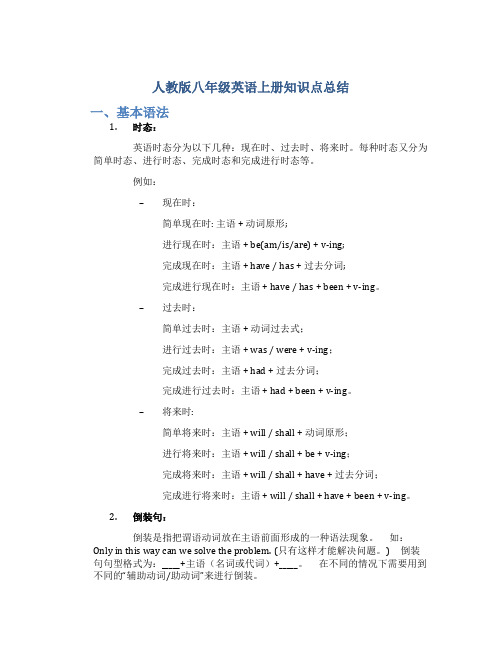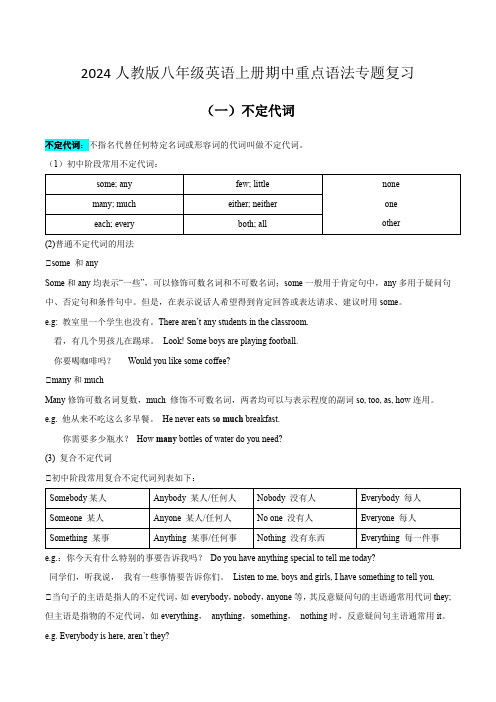人教版八年级上册英语语法复习
- 格式:docx
- 大小:23.71 KB
- 文档页数:17

20232024年八年级英语人教版上册期中复习大盘点专题三:重要语法复习【一】复合不定代词1. 构成:由some,any,every,no加上one,body,thing构成的不定代词称为复合不定代词。
具体见下表:2. 用法(1)复合不定代词相当于名词,在句中可以作主语、宾语和表语,但不能作定语。
(2)复合不定代词被形容词、动词不定式等修饰时,形容词和动词不定式等应置于其后。
(3)复合不定代词作主语时表示单数概念,谓语动词用单数形式。
(4)some-不定代词通常用于肯定句中;any-不定代词则多用于否定句或疑问句中。
但在表示请求、建议等的疑问句中,问话者希望得到肯定答复时,常用含有some-的不定代词,如something,somebody,someone等。
(5)anyone,anything也可用在肯定句中,前者表示“任何人”,后者表示“任何事”。
【二】一般过去时的规则动词与不规则动词英语中的动词按其过去式的构成方式可分为规则动词和不规则动词。
规则动词的过去式一般在词尾加-ed,而不规则动词的变化因词而异。
规则动词过去式的构成口诀:1. 规则动词过去式的构成过去式构成有规律,一般词尾加ed。
如果词尾有个e,直接加d就可以。
辅音字母y结尾,变y为i加ed。
辅重闭作结尾,双写之后加-ed。
2. 不规则动词的过去式变化各异,需要特殊记忆,每个不规则动词的变化形式,都必须牢记。
不规则动词的过去式变化没有统一的规则,但并非一点儿规律也没有,下面我们就介绍一部分动词过去式的记忆规律。
(1)动词的过去式与动词原形同形。
letletputputreadreadcutcut(2)遇见i改为a。
swimswamsingsangbeginbegansitsatgivegavedrinkdrank助记:游泳(swim)唱歌(sing)后,开始(begin)坐(sit)下来,给(give)点儿喝(dink)的吧,i变成a。

人教版初二上册英语学问点总结归纳八年级〔初二〕上册英语语法、短语和学问点总结归纳Unit 1 Where did you go on vacation?本单元的话题:谈论假期活动内容,复习一般过去时。
本单元的语法:1.复习一般过去时;2.学习不定代词和不定副词的用法。
2.不定代词和不定副词的用法:(1)左边的some、any、every、no 与右边的body、one、thing 构成不定代词,some、any、every、no 与右边的疑问副词where 构成不定副词;(2)一般状况下以some 开头的不定代词和不定副词用于确定句,以any 开头的不定代词和不定副词用于否认句、疑问句;以no 开头的不定代词和不定副词表示否认含义(no one 为两个单词);(3)不定代词或不定副词和形容词连用时,形容词放在后面。
He has something important to do. 他有重要的事情要做。
(确定句用something,形容词important 放后)Did you buy anything special? (一般疑问句用anything,形容词special 放后)Did you go anywhere interesting last month? 上个月你去令人感兴趣的地方了吗?(一般疑问句用不定副词anywhere,形容词interesting 放后)(4)不定代词和不定副词做主语时,后面的动词用单数形式。
Everone is here today.今日每个人都在这里。
本单元的短语和学问点:1.go on vacation 去度假go to the mountains 上山/进山2.s tay at home 呆在家go to the beach 去海滩visit museums 参观博物馆go to summer camp 去参观夏令营3. study for tests 为考试而学习\备考go out 出去4. quite a few 相当多,不少(后跟可数名词复数)take photos 照相most of the time大局部时间5.buy sth for sb = buy sb sth为某人买某物6.taste good. 尝起来很好taste(尝起来)、look(看起来)、sound(听起来)为感官动词,后跟形容词7.h ave a good\great\fun time 过得快活,玩得开心(=enjoy oneself) 8. go shopping 去购物9. nothing…but+动词原形:除了……之外什么都没有He had nothing to do at home but read yesterday.昨天他在家除了读书无事可做。

人教版八年级上册英语语法、短语和知识点总结归纳一、语法1. 一般现在时- 用法:表示经常性或惯性的动作或状态。
- 结构:主语 + 动词原形 (+ 其他成分)- 示例:I play soccer every weekend.2. 一般过去时- 用法:表示过去某个时间点或一段时间内发生的动作或存在的状态。
- 结构:主语 + 动词过去式 (+ 其他成分)- 示例:She watched a movie last night.3. 现在进行时- 用法:表示现在正在发生的动作。
- 结构:主语 + am/is/are + 动词-ing (+ 其他成分)- 示例:They are studying for the exam.4. 现在完成时- 用法:表示动作或状态发生在过去某个时间点,但与现在有关。
- 结构:主语 + have/has + 动词过去分词 (+ 其他成分)- 示例:I have finished my homework.5. 情态动词- 用法:表示能力、意愿、可能性等。
- 常见的情态动词有 can, could, may, might, must, should, ought to 等。
- 示例:He should go to bed early.二、短语1. as well as- 用法:表示两个事物同时存在或发生。
- 示例:She can speak English as well as Chinese.2. in order to- 用法:为了做某事。
- 示例:They woke up early in order to catch the train.3. by the way- 用法:用于引入一个新的话题或问题。
- 示例:By the way, have you seen the latest movie?三、知识点1. 直接引语和间接引语- 直接引语:用引号括起来的原话。
- 间接引语:将直接引语转述为陈述句或疑问句。

人教版八年级英语上册知识点总结一、基本语法1.时态:英语时态分为以下几种:现在时、过去时、将来时。
每种时态又分为简单时态、进行时态、完成时态和完成进行时态等。
例如:–现在时:简单现在时: 主语 + 动词原形;进行现在时:主语 + be(am/is/are) + v-ing;完成现在时:主语 + have / has + 过去分词;完成进行现在时:主语 + have / has + been + v-ing。
–过去时:简单过去时:主语 + 动词过去式;进行过去时:主语 + was / were + v-ing;完成过去时:主语 + had + 过去分词;完成进行过去时:主语 + had + been + v-ing。
–将来时:简单将来时:主语 + will / shall + 动词原形;进行将来时:主语 + will / shall + be + v-ing;完成将来时:主语 + will / shall + have + 过去分词;完成进行将来时:主语 + will / shall + have + been + v-ing。
2.倒装句:倒装是指把谓语动词放在主语前面形成的一种语法现象。
如:Only in this way can we solve the problem. (只有这样才能解决问题。
) 倒装句句型格式为:_____+主语(名词或代词)+_____。
在不同的情况下需要用到不同的“辅助动词/助动词”来进行倒装。
3.被动语态:被动语态就是在句子中表达动作的承受者(即主语)的语态。
结构为:被(或受)动责任的动词(to be) + 过去分词。
如:The book was written by him.(这本书是由他写的。
)4.虚拟语气:虚拟语气是指在表示假设,愿望,建议等语气时所使用的一种语态形式。
其结构为:主语+should/could/might/would+(have)+动词原形。
如: If I were you, I would buy this dress(如果我是你,我会买这件衣服。


人教版八年级英语上册语法总结一、一般现在时。
1. 概念。
- 表示经常或习惯性的动作或状态;表示客观事实或普遍真理。
- 例如:I often get up at six o'clock.(经常的动作)- The earth goes around the sun.(客观真理)2. 动词形式。
- 当主语是第三人称单数(he/she/it等)时,动词要加 -s或 -es。
- 一般情况加 -s,如:like - likes;以s, x, ch, sh, o结尾的动词加 -es,如:go - goes, watch - watches;以辅音字母 + y结尾的动词,把y变为i再加 -es,如:study - studies。
- 当主语不是第三人称单数时,动词用原形。
例如:They play football every day.3. 句型结构。
- 肯定句:主语+动词(原形/第三人称单数形式)+其他。
- 否定句:主语+don't/doesn't+动词原形+其他。
(do not = don't,does not = doesn't)- 一般疑问句:Do/Does+主语+动词原形+其他?回答:Yes, 主语+do/does. No, 主语+don't/doesn't.二、一般过去时。
1. 概念。
- 表示过去某个时间发生的动作或存在的状态。
- 例如:I went to the park yesterday.2. 动词形式。
- 一般动词在词尾加 -ed,如:play - played;以不发音的e结尾的动词加 -d,如:live - lived;以重读闭音节结尾且末尾只有一个辅音字母的动词,双写这个辅音字母再加 -ed,如:stop - stopped;以“辅音字母 + y”结尾的动词,把y变为i再加 -ed,如:study - studied。
还有一些不规则动词,如:go - went, see - saw等。

八年级英语上册第八单元必背课文、单词、重点短语与语法梳理汇总一、必背课文2d 对话部分Tony: Hi, Mark. I want to have a class party. Will you help me organize it?Mark: Sure, Tony. I'd love to. When shall we have the party?Tony: Let's have it today after class.Mark: No, today is too busy. If we have it today, half the class won't come.Tony: OK, let's have it tomorrow then.Mark: Hmm... There's a test the day after tomorrow. Students will leave early to study for the test. Why not have it on the weekend?Tony: OK, good idea. Let's have it on Saturday afternoon. We can all meet and watch a video.Mark: No, I don't think we should watch a video. Some students will be bored. Let's play party games instead.Tony: OK, good idea. Can you organize the party games?Mark: Sure, I can do that. And can you make some food for us?Tony: Yes, no problem.这篇对话重点如下:-计划班级派对的讨论:围绕派对的时间、活动内容展开讨论,展示了如何协商安排活动,运用了“will + 动词原形”表示将来可能性的用法,如“half the class won't come”“Students will leave early”等。

人教版八上期末语法复习一、词组1. interesting information 有趣的资料2. let sb. do sth.让某人做某事3. plan to do sth. 计划/打算做某事4. hope to do sth.希望做某事5. happen to do sth. 碰巧做某事6. expect to do sth.盼望做某事7.be ready to do sth.乐于做某事8. grow up成长;长大9. make sure 确信;务必10. write down写下;记下11. have to do with 关于;与……有关系12. take up开始做;学着做13. too…to… 太……而不能……14. practice doing练习做某事15. keep on doing sth.不断地做某事16. finish doing sth.做完某事17. promise to do sth. 许诺去做某事18. on computer在电脑上19. in danger 处于危险之中20. on the earth在地球上21. turn on 接通(电流、煤气、水等);打开22. a good idea好主意23. cut up 切碎24. one more thing还有一件事25. a piece of 一片/张/段/首……26. at this time在这时27. fill… with… 用……把……装满28. one by one一个接一个;逐个;依次29. It’s time (for sb.)+to do sth. 到(某人)做某事的时间了30. prepare for 为……做准备31. another time其他时间32. hang out常去某处;泡在某处33. look after 照看;照顾34. accept an invitaton接受邀请35. turn down an invitation 拒绝邀请36. at the end of this month这个月末37. look forward to doing sth. 盼望;期40.too much homework 太多作业待38. reply in writing书面回复39. not…until 直到……才二、语法归纳:(1)一般过去时1.概念:表示过去发生的动作,常与过去的时间状语连用。

八年级语法全汇总一. 询问某人的健康问题及遭到麻烦的表达方法1. 询问某人患了何种疾病或遇到了何种麻烦时,常用以下几种结构来表达:What’s the matter (with sb.)?(某人)怎么了?What’s wrong (with sb.)?(某人)怎么了?What’s the trouble with sb? 某人出什么事了?What happened to sb? 某人发生了什么事?Are you OK? 你没事吧?Is there anything wrong with sb.?某人有不舒服/麻烦吗?2. 要表达身体疼痛或不舒服,可用以下结构:①某人+have/has+病症The twins have colds.双胞胎感冒了。
②某人+have/has+a+headache/toothache/stomachache/backache/earache. She had a stomachache last night. 她昨晚肚子痛。
③某人+have/has+a+sore+发病部位He has a sore throat. 他喉咙痛。
④某人+hurt(s)+身体部位或反身代词He hurt his leg. 他的腿受伤了。
⑤某部位+hurt(s).My head hurts badly. 我头痛得厉害。
⑥某人+have/has+a pain+in one’s+身体部位I have a pain in my chest. 我胸口痛。
⑦(There is) something wrong with one’s+身体部位There is something wrong with my right eye. 我的右眼有毛病。
⑧其他表达方式She has a heart trouble. 她有心脏病。
He got hit on the head. 他头部受到了撞击。
She cut her finger. 她割破手指了。

人教版八年级上册英语Unit 8 知识点语法归纳总结一、过去进行时(Past Continuous Tense)过去进行时用于表示过去某一时刻或某段时间正在进行的动作或状态。
1. 构成肯定句:主语 + was/were + 动词的ing形式否定句:主语 + was/were not + 动词的ing形式一般疑问句:Was/Were + 主语 + 动词的ing形式?肯定回答:Yes, 主语 + was/were.否定回答:No, 主语 + wasn't/weren't.2. 使用场景过去进行时常用于以下场景:- 表示过去某一时刻正在进行的动作- She was cooking dinner when I arrived. (我到达的时候,她正在做晚饭。
)- 表示过去某一段时间内持续进行的动作- They were playing basketball all afternoon. (他们整个下午都在打篮球。
)- 表示过去两个同时进行的动作- While he was studying, I was watching TV. (他在研究的时候,我正在看电视。
)二、过去完成时(Past Perfect Tense)过去完成时用于表示在过去某一时间或动作之前已经发生的动作或状态。
1. 构成肯定句:主语 + had + 过去分词否定句:主语 + hadn't + 过去分词一般疑问句:Had + 主语 + 过去分词?肯定回答:Yes, 主语 + had.否定回答:No, 主语 + hadn't.2. 使用场景过去完成时常用于以下场景:- 表示在过去某一时间或动作之前已经发生的动作- They had already left when I arrived. (当我到达时,他们已经离开了。
)- 表示过去某一时间之前已经完成的动作- She had finished her homework before dinner. (她在晚饭之前已经完成了作业。

新人教版八年级上册英语语法,短语和知识点总结一、语法1、时态(1)一般现在时:表示经常性或习惯性的动作或存在的状态,常和表示频度的时间状语连用,如:always, usually, often, sometimes, seldom, never等。
(2)一般过去时:表示过去发生的动作或存在的状态,常和表示过去的时间状语连用,如:yesterday, last week, an hour ago, in 2004等。
(3)现在完成时:表示从过去某一时间一直持续到现在的动作或状态,常和表示过去的时间状语连用,如:since, for, already, yet等。
(4)过去完成时:表示过去某一时间之前已经发生或完成的动作,常和表示过去的时间状语连用,如:before, by the time, when, after等。
2、情态动词(1)can:能够、会(2)could:能够、会(过去式)(3)must:必须(4)have to:不得不、必须(5)should:应该、将要(6)would:将要(过去式)3、虚拟语气(1)一般现在时:主语+should/were to +动词原形+其他(2)一般过去时:主语+should/were to have +过去分词+其他二、短语1、make a difference:有影响,有区别2、at once:立即,马上3、take care of:照顾,照料4、in the end:最后,终于5、be good at:擅长于6、as well as:也,又7、keep healthy:保持健康8、come true:实现,成真三、知识点一般现在时:表示经常性或习惯性的动作或存在的状态,常和表示频度的时间状语连用,如:always, usually, often, sometimes, seldom, never等。

2024人教版八年级英语上册期中重点语法专题复习(一)不定代词不定代词:不指名代替任何特定名词或形容词的代词叫做不定代词。
(1)初中阶段常用不定代词:(2)普通不定代词的用法①some 和anySome和any均表示“一些”,可以修饰可数名词和不可数名词;some一般用于肯定句中,any多用于疑问句中、否定句和条件句中。
但是,在表示说话人希望得到肯定回答或表达请求、建议时用some。
e.g: 教室里一个学生也没有。
There aren’t any students in the classroom.看,有几个男孩儿在踢球。
Look! Some boys are playing football.你要喝咖啡吗?Would you like some coffee?①many和muchMany修饰可数名词复数,much 修饰不可数名词,两者均可以与表示程度的副词so, too, as, how连用。
e.g. 他从来不吃这么多早餐。
He never eats so much breakfast.你需要多少瓶水?How many bottles of water do you need?(3) 复合不定代词①初中阶段常用复合不定代词列表如下:e.g.:你今天有什么特别的事要告诉我吗?Do you have anything special to tell me today?同学们,听我说,我有一些事情要告诉你们。
Listen to me, boys and girls, I have something to tell you.①当句子的主语是指人的不定代词,如everybody,nobody,anyone等,其反意疑问句的主语通常用代词they; 但主语是指物的不定代词,如everything,anything,something,nothing时,反意疑问句主语通常用it。
e.g. Everybody is here, aren’t they?Everything is ready, isn’t it?①当形容词或else修饰不定代词something,anything,everyone时,形容词或者else必须放在这些词后面。

八年级上册英语语法人教版一、一般过去时。
1. 概念:表示过去某个时间发生的动作或存在的状态。
2. 构成:主语 + 动词的过去式 + 其他。
3. 常见的时间状语:yesterday(昨天), last week(上周), ago(以前), in 2000(在 2000 年)等。
二、频度副词。
1. always(总是), usually(通常), often(经常), sometimes(有时), seldom(很少), never(从不)2. 频度副词在句中的位置:通常位于行为动词之前,be 动词、助动词或情态动词之后。
三、形容词和副词的比较级和最高级。
1. 构成规则:- 一般在词尾加 -er / -est。
- 以不发音的字母 e 结尾的,加 -r / -st。
- 重读闭音节词,双写末尾辅音字母,再加 -er / -est。
- 以“辅音字母 + y”结尾的词,改 y 为 i,再加 -er / -est。
- 多音节词和部分双音节词,在前面加 more / most。
2. 用法:- 比较级用于两者之间的比较,“A + be + 比较级 + than + B”四、宾语从句。
1. 概念:在句子中作宾语的从句叫宾语从句。
2. 宾语从句的语序:要用陈述句语序,即“连接词 + 主语 + 谓语 + 其他”。
3. 宾语从句的时态:- 主句是一般现在时,从句根据实际情况使用相应时态。
- 主句是一般过去时,从句要用相应的过去时态。
五、if 引导的条件状语从句。
1. 结构:if + 一般现在时,主语 + will / can / may + 动词原形。
2. 含义:如果……,(主语)将/能/可以……。

⼈教版初中英语⼋年级上册英语知识点归纳总结复习(单词、短语、句⼦、语法、练习)⼈教版初中英语⼋年级上册英语知识点归纳总结复习Unit1 Where did you go on vacation?单词anyone ['eniw?n] pron.任何⼈anywhere ['eniwe?(r)] adv.任何地⽅n.任何(⼀个)地⽅wonderful ['w?nd?fl] adj.精彩的;极好的few [fju?] adj.很少的;n.少量most [m??st] adj.最多的;⼤多数的;something ['s?mθ??] pron.某事物;pron.没有什么n.没有myself [ma?'self] pron.我⾃⼰nothing(=not…anything) ['n?θ??]everyone ['evriw?n] pron.每⼈;⼈⼈yourself [j??'self] pron.你⾃⼰;你亲⾃hen [hen] n.母鸡;雌禽bored [b??d] adj.⽆聊的;厌烦的;郁闷的pig n.猪diary ['da??ri] n.⽇记;⽇记簿(keep a diary) seem [si?m] vi.似乎;好像someone ['s?mw?n] pron.某⼈;有⼈quite a few相当多;不少(后接可数名词)of course [?vk??s] 当然activity [?k't?v?ti] n.活动;活跃decide [d?'sa?d] v.决定;选定(decide to do sth.)try [tra?] v.尝试;设法;努⼒(try to do sth. /try doing sth.) bird [b??d] n.鸟;禽paragliding ['p?r?ɡla?d??] n.空中滑翔跳伞bicycle ['ba?s?kl] n.⾃⾏车building ['b?ld??] n.建筑物trader ['tre?d?(r)] n.商⼈;商船wonder ['w?nd?(r)] v.惊奇;想知道;怀疑difference ['d?fr?ns] n.差异;不同top [t?p] n.顶部;顶wait [we?t] v.等;等待(wait for) umbrella [?m'brel?] n.伞;⾬伞wet [wet] adj.湿的;⾬天的below [b?'l??] prep.低于;在...下⾯adv.在下⾯as [?z] conj.如同;像...⼀样enough [?'n?f] adj.⾜够的adv.⾜够地;充分地duck [d?k] n.鸭⾁;鸭hungry(反full) ['h??ɡri] adj.饥饿的;渴望的feel like(doing sth.)想要dislike [d?s'la?k] v.不喜欢;厌恶n.不喜爱;厌恶;反感重点短语1. go on vacation去度假2.stay at home 待在家⾥3.go to the mountains 去爬⼭4. go to the beach 去海滩5. visit museums 参观博物馆6. go to summer camp 去参加夏令营7.quite a few 相当多8.study for 为……⽽学习9.go out 出去10.most of the time ⼤部分时间11. taste good 尝起来很好吃12.have a good time 玩得⾼兴13. of course 当然14.feel like 给……的感觉;感受到15.go shopping 去购物16.in the past 在过去17. walk around 四处⾛⾛18. because of 因为⼀碗…… 20. the next day 第⼆天21. drink tea 喝茶19. one bowl of… 22. find out 找出;查明23. go on 继续24.take photos 照相25. something important 重要的事26. up and down 上上下下27. come up 出来28. buy sth. for sb. / buy sb. sth. 为某⼈买某物29. taste + adj. 尝起来…… 动词原形除了……之外什么都没有30. look+adj. 看起来…… 31.nothing…but+32.seem+(to be)+ adj. 看起来…… 33. arrive in+⼤地点/ arrive at+⼩地点到达某地34.decide to do sth. 决定去做某事35. try doing sth. 尝试做某事/ 36. try to do sth. 尽⼒去做某事37. forget doing sth. 忘记做过某事/ 38. forget to do sth. 忘记做某事39. enjoy doing sth. 喜欢做某事40. want to do sth. 想去做某事41. start doing sth. 开始做某事42. stop doing sth. 停⽌做某事43. dislike doing sth.不喜欢做某事44. keep doing sth. 继续做某事45. Why not do. sth.? 为什么不做……呢?46. so+adj.+that+从句如此……以⾄于…… 47. tell sb. (not) to do sth. 告诉某⼈(不要)做某事48 .have a good time=enjoy oneself=have fun(doing sth.)玩得痛快三、重点句⼦:1. Where did you go on vacation? 你去哪⼉度假的?2. Long time no see. 好久不见。
人教版八年级上册英语语法复习试题一、用括号里的词的适当形式填空。
1. If you give me time, I _______ (find) the solution.2. If you want to pass, you ________ (have to) study hard.3. What ________ (happen) if they don 't agree with each other?4. Beckham is a famous football ______ (play).5. My father madea living by ____________ (sell)small toys when he was young.6. Did the children enjoy ___________ (they)in the party last Sunday?7. The college graduate enjoyed _____ (teach)in the poor mountain area8. He ______ (have)a great time if he ________ (come)to the party tomorrow.9. I think tomorrow is a good time ____ (have)the party, Everyone _____ (have) fun at that time.10. Half the class ___________ (stay)at home on the weekend now.11. I will also be able ______ (work)outside sometimes.12. What about _____ (listen)to the radio?13. The _____ (three)shirt is the nicest ofall.14. This bag is much ______ (big)than that one.15. Most students spent more than one hour _________ (write)the composition.16. All of us were surprised ____ (see)how Americans abused the Iraqi prisoners.17. I don't know if he __(come)tomorrow, but if he__(come)tomorrow, I'll let you.18. _______ (join)the Lions, and you _____ (become)a great soccer player.19. In the past, Peter ____ (spend )a lot of time everyday _______ (play)football.20. If he ___ (stay)at home, he'll be sorry.21. I am learning how _____ (swim).22. Many of my friends are ____ (lawyer).23. ____ ( watch )TV too much is bad for your eyes.24. Could you tell us the ____ ( different )between thesetwo styles of music?二.句型转换。
1」f I go to the party, I 'll bri ng them some flowers J _________ 戈U 线提问)________________ bring _______ i f you go to the party?2.Study hard, and you'll pass the En glish exam. (变同义句)_____ study hard, ______ pass the En glish exam3. Wear jea ns, and we won't let you in. (变同义句)_____ wear jea ns, we won't let youin.二.根据汉语意思,完成下列句子1. 他如果看电视太久了,他的父母会不高兴。
If he ___________ TV too much, his parents ________________ _________ unhappy.2. 如果他有空,他会帮助你的。
If he ______________ , he __________ you.3. 如果我们不去开会,会发生什么?_______________________ if we____go to the meeti ng?四.单项选择()1. --- _ your friend _the guitar at the concert?---Y es, he will.A. Will; playsB. Shall; playC. Will; playD. Do; play( ) 2. If he _____ go to college, he will have to work.A. toB. doesC. doesn ' tD. isn ' t( ) 3. There are many tall trees on ______ side of thestreet.A. bothB. allC. eitherD. neither( ) 4. --- Whynot _______ for help whenyou were in trouble?---Next time, I will.A. you askB. askC. askingD. to ask( )5. If you go to the party, you ___ a good time.A. would haveB. haveC. will haveD. had( )6. Don't bring food to school. If you do, the teachers will__A.take it awayB. take them awayC. take away itD. take away them ( )7. Please ________ your big dictionary when you comehere.A. bringB. takeC. carryD. fetch( )8. Do n' t _______ jeans to the party.A. put onB. wearC. wearingD. dress ( )9. Jim asked me ______ him with his math.A. helpB. helpingC. helpedD. to help ( )10. -What are you going to do tomorrow? - _____ .A. Nothing muchB. Much nothingC. Not anythingD. No thing ( )11. If we get there early, we ______________ things to a shop.A. buyB.boughtC.will buyD.would buy( )12. The text is very hard for you. There are ____ newwords in it.A.a fewB.a littleC.fewD.little( )13. ___ of the two new books are interesting .A. AllB. BothC. AnyD.Either( )14.They didn ' t go to bed _________ they finished their homework.A. untilB. becauseC. whenD. if( )15.Thank you for ____ me the news. I ' m glad to hearthat.A. tellB. tellingC. tellsD. told( )16.Is there _____ I can do for you?A. somethingB. anythingC. everythingD. nothing( )17.My watch is not here. Maybe ______ took it.A. somebodyB. anybodyC. everybodyD. nobody ( )18. This work is _____________________ for me than for you.A .difficult B.the most difficult C .most difficult D.more difficult五、用所给单词的适当形式填空。
(10 分)1. ________________________________________ D id you decide__________________________________________ (visit) your grandparents?2. ________________________________ There are many (different) betweenthem.3.I can ' t stand _________________ (hear) the bad news.4. ____________________________________ Lucy and Lily are the ______________________________________ (win) of thetalent show.5. ___________________________________ This shirt isn 't as_____________________________________ (good) as that one.6. _____________________________ He is the (bad) student in his7. ___________________________ The news (be) so terrible that ____________________ we allcan't stand.8.I really enjoyed ______________________ (walk) around town. 9」t is good to relax by __________________________ (use)in ternet.lO.Did you have fun ___________________ (play) at the party?六、句型转换(10分)1」go to dance three times a week.(对划线部分提问)________________________ d o you go to dance?2. Do you want to come?(同义句)___________ you _________ to come?3. Tom isn ' t as good as Tim at playing the drum.(同义句)Tim is _______ a t playi ng the drum __________ Tom.4.She is taller tha n any other stude nt in her class.(同义句)She is ____________________ student in her class.5」thi nk my mother is smarter tha n my father.(否定句)I ____________ my mother ______________ smarter tha n my6.What do you thi nk of the movie?(同义句)______________________________________ the movie?七、单项选择(25分)()1.Lily __________ stay at homebecause of the bad weather.A.had toB.must toC.mustD.should( )2.There is _______________ junk food here,and it is_________ terrible.A.too much,too muchB.much too,much tooC.too much,much tooD.muchtoo, muchtoo ( )3. —Doyou enjoy ____ here? —No,I want ____ there by bike.A.walking,to goB.to walk, to goC.walking,goingD.to walk, going ( )4.We stopped___and___because we were tired and thirsty.A.working,to drinkB.to work, drinkingC.to work, to drinkD.working,drinking( )5.He likes playing ________ tennis,and he dislikes playing____ drum.A.\, \B.\, theC.the,\D.the,the ( )6.Lisa is than her sister.A.more smarterB.much smarterC.more smartD.very smarter ( )7.She often pratices ____________ English by _______ to the foreigners.A.speaking,talkingB.to speak, to talkC. speak in g,to talkD.to speak, talk ing()8.He is different ______ his brother,but he is similar __ his father.A.from, fromB.to, toC.from, toD.to, from()9.He ofte n ____ jokes and makes us ______ .A.talks,laughB.tells, laughC.talks, to laughD. tells, to laugh()10.Tha nks _________ me! A.for tell B.to tellC. to telli ngD.for telli ng()11. —_____ is it from your home? —10 minu tes by bus. A.How far B.How long C.How ofte n D.How soon()12.Pare nts usually _____ a role in ______ t heir kids.A.play,helpi ngB.make, helpi ngC.play,helpD. make,help( )13.Students should study hard to make their dreamse oute upe truee on ()14.I can ' t stand _ the noisy music,let him it.A. heari ng, stopB.to hear,stopC.heari ng,to stopD.to hear, to stop( )15. —Would you mind ____________ Mickey Mouse? —No, I enjoy ________ it.A.watching, watchingB.to watch, to watchC.watching, to watchD.towatch, watching( )16.If I have __,I can do___.A.enoght time, enogh wellB.enough time,well enoughC.time enough, enough wellD.time enough,well enogh ( )17.We had a good time ___because of the fine weather.A.to danceB.at dancingC.dancingD.of dancing( )18._________ it rained heavy,____ went on visiting.A.Though, butB.But, thoughC.Though, \( )19 . In our city, it 's __in July, but it 's even ______inAugust .A. hotter, hottestB. hot, hotC. hotter, hotD. hot, hotter( )20. Jay Chou' s music sounds ______ . I like it verymuch.A. niceB. wellC. badD. quickly( )21 .We _________ TV when the telephone rang.A. watchedB. were watchi ngC. watchD. are watchi ng()22 . It ' s very important _ _us ______________ English well.A. of …learningB. for …lear ningC. of …to lear nD.for …to learn()23. The policeman asked the children ________ in the street.A. not to playB. to not playC. don ' t playD. playi ng()24. I _____ go to bed ___ I fini shed my homework.A. didn ' t, whenB. /, untilC. didn ' t, untilD.won' t, un til()25. All the people should do their best ___________ thework.A. to finishB. finishC. finishedD. finishing( )26.Tara and her sister __________________ quiet and they sports.A.are both,both likeB.are both, like bothC.both are, both likeD.both are,like both()27 .If you want to be a stude nt helper, you must be good childre n.A.atB.withC.forD.in()28.Tom can play drums,but Sam can play tenni _A.the,theB.the,/C./,theD./,/()29.Lily ' s books are new than _____________A.weC.ourD.ours()30. —Have you see n the funny movie Let the Bullet Fly? ——Yes, it made me __________ m any times.A」augh B. cry C. Sleep D. si ng八、用括号中所给单词的适当形式填空。